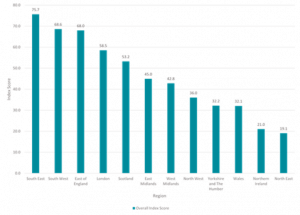- Overall financial health is four times higher in the South East than in the North East
- Yet high costs of living mean even relatively wealthy South East households have a lower perception of their wealth
- Scotland sees highest growth in average household wealth in last decade at 66% – versus 19% for London and 18% in the North East
- More than half (51%) of people state they are not financially comfortable and 78% claim they do not consider themselves wealthy
- Less than two in five (38%) have a financial plan in place for future, according to the research conducted with CEBR
Financial health is four times higher in the South East than the North East, underlining the scale of efforts needed for ‘levelling up’ financial wealth and wellbeing across the country, according to the first UK Financial Health Index from wealth management group St. James’s Place.
The SJP UK Financial Health Index, developed in conjunction with the Centre of Economics and Business Research (CEBR), analyses how wealth is distributed across the nation and where financial health is strongest. The Index is broken down into three distinct pillars: Wealth, Wealth Drivers, and Perceived Financial Wellbeing, with each pillar consisting of several indicators which measure a certain element of an individual’s financial position.
The Index highlights a clear North-South divide with the South West, the South East and the East of England performing much better on the Index than their northern counterparts. The South-East is the region with the strongest overall financial health, with a score of 76 out of a possible 100. Meanwhile, the North East is the lowest ranked region, attaining a score of only 19.

Perceptions don’t always match the reality
When it comes to perceived wellbeing, the South East and London performed relatively poorly, despite being two of the highest ranking regions on the Wealth and Wealth Drivers pillars. Despite average total wealth in London at approximately £1million, substantially more than any other region and the UK average of £384,208, the capital ranked the fourth lowest UK region for perceived wellbeing. When looking at two indicators in particular – being up to date with all bills and whether financial constraints impact quality of life – London attained the lowest score across all regions for both. In addition, the disparity between the average total wealth in London and the rest of the country is largely due to property prices which accounts for over half of Londoners’ average total wealth.
Similarly, despite the South East topping the table in terms of financial, pension and physical wealth, issues such as cost of living and being unable to handle an unexpected bill drive much poorer relative perceptions of wealth in the region – ranking 6th out of the 12 regions on the Perceived Wellbeing pillar. On the other hand, Scotland ranks the highest in terms of perceived wellbeing, despite coming mid-table in the Wealth and Wealth Drivers categories (6th and 5th respectively).
Beyond the North-South divide
Wales and Northern Ireland score low on the SJP UK Financial Health Index – 32 and 21 respectively – placing them third and second lowest after the North East. Northern Ireland scores lowest (13) and Wales scores third lowest (23) on the Wealth Drivers pillar, and they rank lowest on perceived wealth too. People in Wales are most likely to attribute their growth in wealth to rising house prices (45%), and least likely to attribute wealth growth to investment performance (19%), while Northern Ireland is the region most likely to cite the cost of living as the key impediment behind wealth growth (51%).
Notably, Scottish households have enjoyed the biggest wealth growth over the last ten years, attaining the highest annual growth rate across all regions, with average wealth in the region growing by 66%. In comparison, average household wealth in the North East only grew by 18% in the same period, and by 19% in London.
















